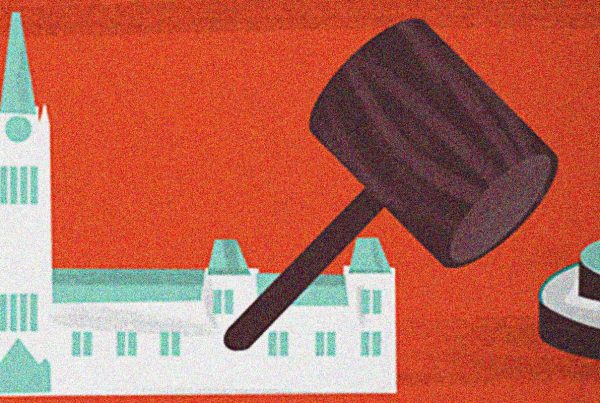Because the Learn section of TalkRights features content produced by CCLA volunteers and interviews with experts in their own words, opinions expressed here do not necessarily represent the CCLA’s own policies or positions. For official publications, key reports, position papers, legal documentation, and up-to-date news about the CCLA’s work check out the In Focus section of our website.
BILL C-50: An Act to Amend the Canada Elections Act
Bill C-50 (“the Bill”), also called the Citizen Voting Act, is sponsored by the Minister of Democratic Reform, Pierre Poilievre (“the Minister”) (read it on Parliament’s website here). It has reached its second reading in the House. The Bill amends the Canada Elections Act (“CEA”), which deals with elections and by-elections for federal government in Canada(see the Canada Elections Act here). In particular, the Bill creates new restrictions for Canadian citizens living abroad who want to vote in federal elections. It raises important civil liberties concerns: non-resident Canadians already face obstacles to exercising their right to vote in federal elections, and the Bill makes this exercise harder still. The Bill also limits the types of documents that voters in Canada and abroad can use to prove identity and residence.
Background
The CEA currently sets out conditions under which Canadian citizens living abroad can vote by mail in federal elections. There are two general conditions under which this can happen. First, all Canadian citizens who have been away for less than five consecutive years and intend to return may vote. Second, Canadian citizens who fit into one of the listed groups – including public servants posted outside Canada, members of the Canadian Forces, and various others – may also vote, however long they have been outside Canada (CEA).
The effect of the CEA is that Canadians who have lived abroad for more than five years and do not fit into one of the exempted groups cannot vote in federal elections. After the CEA was passed, two Canadians who had been non-resident for over five years challenged this restriction in court. They argued that the loss of their right to vote violated s. 3 of the Charter of Rights and Freedoms, which says: “Every citizen of Canada has the right to vote in an election of members of the House of Commons or of a legislative assembly and to be qualified for membership therein.” Justice Penny of the Ontario Superior Court of Justice agreed. In Frank et al. v AG Canada, he struck down the restricting provisions of the CEA – in effect extending the right to vote in federal elections to all Canadian citizens abroad. Elections Canada then began allowing these Canadians to register to vote (a request for a stay pending appeal was refused by the ONCA: Frank v Canada (Attorney General), 2014 ONCA 485. The response of Elections Canada can be found here).
Later that year, the Canadian government introduced Bill C-50, which also relates to voting by non-resident citizens. But the Bill does not address the unconstitutionality of the five-year restriction. It does not change the provisions struck down in Frank. In fact, the government is appealing Frank in an attempt to defend the restrictive provisions.
What is in the Bill?
The Bill makes several major changes to the CEA:
(1) Canadians living abroad must re-apply for a special ballot for each federal election after the writ has been issued (Clause 8).
(2) Special ballots for non-resident Canadian voters can only be issued for the address where the voter last resided in Canada, and applications for special ballots must include proof of Canadian citizenship, identity and residence. (Clause 9 and 14)
(3) Documents used for proof of identity and reference – for special ballots or ordinary voting – must be issued by a Canadian government or an entity formed in Canada. (Clause 4)
(4) The Minister of Citizenship and Immigration may share information with Elections Canada to remove non-citizens from the voting register. (Clause 2)
(5) Certain new criminal offences are created. (Clause 16 and 17)
The Bill does not change the five-year requirement, which was declared invalid in Frank.
What are the civil liberties concerns?
The Bill makes it harder for Canadians who live abroad to vote. Under s. 3 of the Charter, Canadian citizens have the right to vote in federal elections. Courts have struck down restrictions on voting by prisoners and by those who have lived abroad for more than five years (see Sauvé v Canada (Chief Electoral Officer). The right to vote “lies at the heart of Canadian democracy.”
The Bill does not repeal the now-invalid rule that Canadians who have lived abroad for more than five years cannot vote by mail. The government has appealed the Frank decision to defend this rule (see link). Instead, the Bill may create additional obstacles for non-resident Canadians who wish to vote.
The changes listed under (1), (2) and (3) above all raise specific issues:
(1) The Bill requires Canadians living abroad to apply for a special ballot in a given election only after the writ has been dropped. This is a new requirement. Currently, the CEA allows non-resident Canadians to register at any time – including before the writ is issued – and it does not require them to re-apply for a special ballot at every election. Bill C-50 shortens the length of time during which potential voters can apply for, receive and send back their special ballot. It raises the worry that some Canadians will not be able to submit their applications and receive their ballots in time to vote.
This change makes it harder for non-resident Canadians to exercise their right to vote than those who live in Canada. Only those living abroad will have to wait until the writ is issued before registering to vote and to re-register for every election. (Those in Canada can register to vote at any time, though they must wait for the writ to be issued if they wish to vote by mail.) It is unclear what the reason is for this requirement. The government’s backgrounder (available here) suggests that special ballots might be sent to residences where the voter no longer lives, but provides no evidence that this has happened or that fraud has occurred.
(2) Under the present CEA, non-resident voters have to provide their “place of ordinary residence” and vote in that riding. This can be the last place they lived in Canada, but it can also be the residence of a spouse, family member or someone else who the voter would live with if they were not abroad. Under the Bill, non-resident Canadians can only register to vote in the riding where they last lived in Canada. The Bill also requires these Canadians to provide proof of their last place of residence (Clause 9).
The government has defended this provision of the Bill on the ground that it will prevent “riding shopping”. This is the possibility that non-resident Canadians might choose to vote in ridings to which they have no personal connection – or even that large numbers of voters abroad will conspire to all vote in one particular riding. There is no evidence that this has occurred (see Frank).
The requirement to prove residence creates a major problem: some Canadians abroad may have proof of citizenship but no proof of their former address in Canada. They may not still have a Canadian driving license or other government-issued ID. The Bill makes it harder for these Canadians to vote and may prevent them from voting altogether.
For those who do not have proof of residence, there is a procedure for taking a written oath and having your address attested to instead (Clause 3). But the person doing the attesting must (i) know the voter personally, (ii) not have their own address attested to, (iii) be qualified to vote in the same riding and (iv) only attest to one voter’s address. This may not be possible for some voters. Even if it is, the requirement to re-apply every time an election is called means that some voters may not get attestations submitted in time.
(3) The Bill puts new restrictions on the kinds of documents that can be used to prove identity and residence. This change applies not just to Canadians living abroad but also to those living in Canada and voting at polling stations. Previously, the CEA allowed for (a) photo ID issued by a Canadian government or (b) any other type of document authorized by the Chief Electoral Officer (CEA). Under (b), the Chief Electoral Officer can authorize any type of document “regardless of who issued the document”. Bill C-50, however, prohibits the authorization of documents that are not issued by a Canadian government or “an entity that is incorporated or formed by or under an Act of Parliament or of the legislature of a province or that is otherwise formed in Canada” (Clause 4). In short, documents that come from an entity not “formed in Canada” are not allowed.
By reducing the kinds of document that can be authorized as proof of identity and residence, the Bill makes it harder for some Canadians to vote. This will particularly affect those who live outside of Canada and do not have anyone to attest to their residence. The scope of the new rule is also uncertain as it is not clear what kinds of entities will count as “formed in Canada”. It might turn out that some documents – like credit card statements or letters from universities – will not count if the company or university is based outside Canada (Both of these types of documents are currently accepted by Elections Canada).
In sum: Bill C-50 does not repeal the restrictions on non-resident voting that were declared unconstitutional in Frank. It creates several new obstacles to voting by those who live abroad: it forces them to re-apply in a short time period for every election, demands proof of past residence, creates a difficult attestation procedure and reduces the kinds of documents that can be used as proof. By making it harder for some Canadians to vote, the Bill threatens a fundamental right.
Related resources
Dara Lithwick, Library of Parliament, “Legislative Summary of Bill C-50: An Act to Amend the Canada Elections Act”
Althia Raj, “Bill C-50, Citizen Voting Act, Would Suppress Votes, NDP Say”, Huffington Post.
Craig Scott MP, “Why make it hard to vote?”, National Post.
Kira Demendeev, CCLA Rights Watch, “The Right to Vote as an Expatriate.”
Colin Perkel, “Feds fight to deny long-term expats right to vote as case heads to appeal”, Globe and Mail.
About the Canadian Civil Liberties Association
The CCLA is an independent, non-profit organization with supporters from across the country. Founded in 1964, the CCLA is a national human rights organization committed to defending the rights, dignity, safety, and freedoms of all people in Canada.
For the Media
For further comments, please contact us at media@ccla.org.




